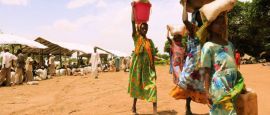Central African Republic: Doing business & staying in touch
Doing business in Central African Republic
A knowledge of French is essential. Interpreter and translation services may be available at large hotels. Business cards should be in French and English. Formal wear is expected (suits and ties for men). The best months for business visits are between November and May.
Agriculture, upon which most of the population depends, is concentrated on subsistence crops plus coffee, cotton and wood as cash crops for export. Livestock and tobacco are also exported. The main cash earner is timber, which has been heavily exploited with little government restriction.
The country's mining industry is largely devoted to diamonds; a small quantity of gold is also produced. Other deposits, including uranium, copper, manganese and iron ore, are yet to be exploited.
The small manufacturing sector is devoted to the processing of primary products to produce food and drinks, wood products and textiles.
The overall economic development of the Central African Republic has been limited by an adverse climate, poor infrastructure and low world commodity prices. With a per capita annual income of just US$700, the Central African Republic is one of Africa's poorest countries. The GDP growth rate was 3.7% in 2010.
The Central African Republic is a member of the Central African Economic and Monetary Union (CEMAC), the main regional trading organisation. France provides extensive economic and financial aid and is the country's main trading partner.
Food, textiles, petroleum products, machinery, electrical equipment, motor vehicles, chemicals and pharmaceuticals.
Keeping in Touch in Central African Republic
Roaming agreements exist with a few international mobile phone companies. Coverage is limited to the capital, Bangui.
There is a post office in each prefecture. Local postal services are unreliable. Both postal and telecommunications services are in the process of being developed. Airmail services to Europe take approximately one week, although it is often much longer; surface mail can take up to three months.
Mon-Fri 0730-1130 and 1430-1630; Sat 1430-1830; Sun 0800-1100, open for stamps and telegrams only.
There is journalistic freedom in the Central African Republic to the extent that private newspapers criticise Government policies and allegations of corruption, but these are likely permitted because most of the populace both cannot afford them and cannot read them (there is a high rate of illiteracy in the country). Televsion stations include Television Centrafricaine (state-run) and Tropic RTV (private); newspapers include the state-owned Centrafrique-Presse; and radio stations include the UN-backed Radio Ndeke Luka. State run radio and TV stations provide little to no coverage of the political opposition. It was only until 2004 that prison terms for press offences were abolished.
There are several daily newspapers, including Le Citoyen (an independent publication), Le Confident (an independent publication) and L'Hirondelle (an independent publication).
The weekly publications have limited distribution and are in French.
Centrafrique-Presse is a state-owned bi-monthly publication.








 You know where
You know where